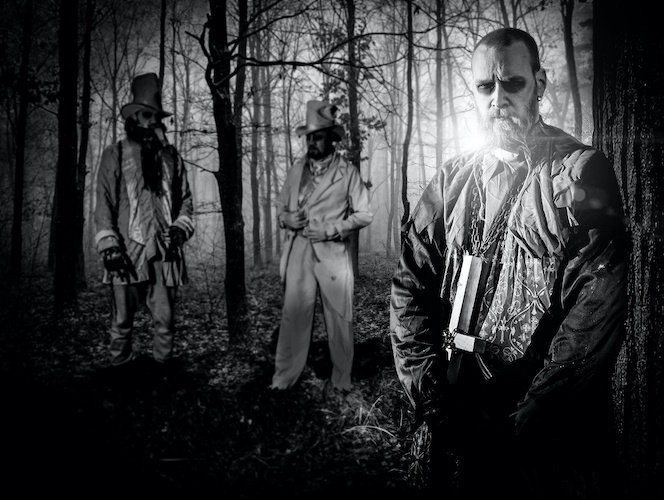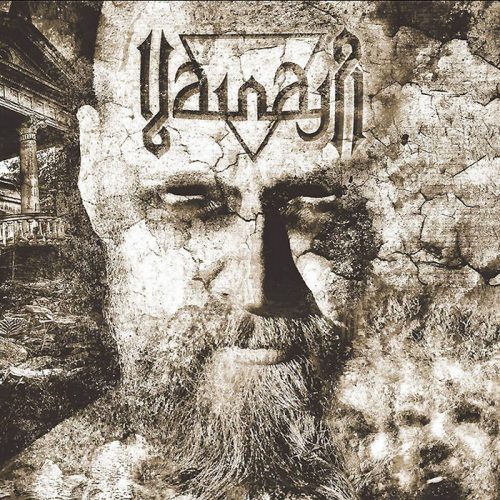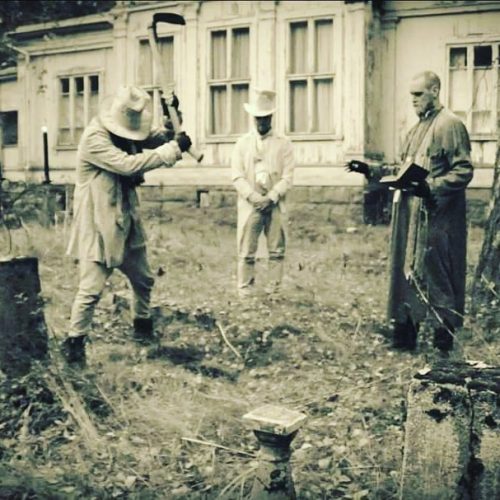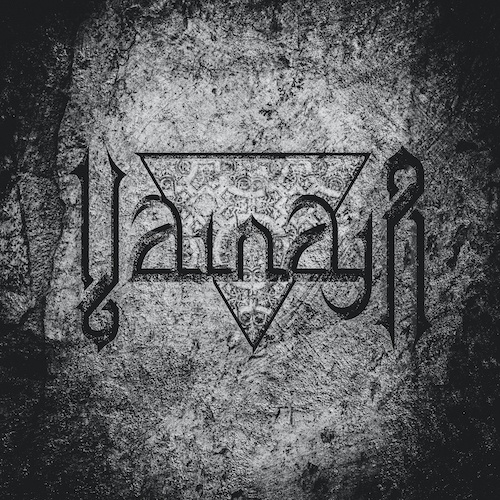
(We present a very timely interview by Comrade Aleks of a fascinating death-doom band — Finland’s Vainaja — who released a new EP just two days ago.)
Vainaja is one of most specific and obscure recent Finnish death doom bands. All members of this grim trio have played in the death/thrash metal outfit Demolisher since 2005 but made the decision to slow down and started Vainaja in 2011. Since then they’ve worked on telling their own “conceptual storyline of religious horrors” with the universal tongue of dense, a bit raw, and deep death-doom.
Vainaja are Aukusti the Gravedigger (drums, vocals), Kristian the Cantor (guitars, vocals), and Wilhelm the Preacherman (vocals, bass). Together, Vainaja have created two full-length liturgies – Kadotetut (2014) and Verenvalaja (2016), which have their own features but are united with the same story. And as Vainaja are just releasing a new EP, Kiviristi, that will expand this story, it felt so damn right to know more about this Cult’s inner work. With Kristian the Cantor’s blessing let’s start this pilgrimage of grief, death, and unavoidable doom, for the last times are upon us.
Kristian, Vainaja was started in 2010, and it seems that from the start you consciously followed a certain vision which spreads through your music and lyrics. What was your plan from the start? Did you really aim for that sound you developed through both of your albums?
Actually that is a very good question, as many bands develop their concept slowly over time. But as you already guessed, Vainaja really was as a concept to start with. What it means to play heavy music today has been a dilemma for us. You’ll always find heavier, slower, faster, and whatever bands if you only try to grasp extremities. Musically Vainaja derives from the organic slow and heavy side, but it’s actually the whole concept that we wanted to form in order to start. We chose the Finnish language for our expression not only because it’s natural for us, but also because we wanted to reanimate the cultural history of this small Northern place. The band consists of multiple stories revolving around the three characters. And that’s Vainaja. So yes, everything was quite well planned way before we released anything. And it’s actually a bit surprising that we have followed the path.

Your debut album Kadotetut was released by Svart in 2014. How much time did you spend writing it? Which core ideas did you want to express through it?
Songs on the album were composed rather quickly and recorded already in 2011. The core was also pretty simple. We wanted to create songs together, thus making compositions together from the start. Simple, straight-forward songs. The riffs ranged from completely new to some created in the early ’90s death metal era. Within a year we had composed most of the songs that we’d play together. The conceptual part took almost another year, because we wanted to invest a lot of thought for that. During that phase we nurtured the raw songs into an entity, and to it we added the atmospheric parts. As many rock bands do, we arranged the lyrics to almost-final song structures. That of course led to forming the final track listing, as the lyrics had to carry the story through.
The material has a distinctive earthen, dense sound and its vibe carefully reminds of the Evoken sound of death doom from the ’90s with grim atmosphere and a quite modern approach. How did you achieve such a result? Was your recording session stressful or did you manage to have some fun in the process?
Recording Kadotetut was quite a fun and interesting learning process. One of the things we actually hadn’t decided beforehand was to do everything by ourselves. But we had planned that everything had to be simple and natural. We did the recording at the same space where we had rehearsed, and did the mixing too. Final mastering was then appointed to be done by Dan Swanö. Doing the main process ourselves left us free of worrying about deadlines. Most of us have been around playing heavy music from the early ’90s, which makes your reference an accurate one. And maybe earthen density comes from the dirty rehearsal room sound!
Vainaja – ViimeinenTuomio
Did the album’s release bring you recognition? You used Finnish lyrics in your songs, and some bands think that using lyrics written in their mother tongue builds obstacles on their way to foreign listeners.
The album evoked recognition in a way we hadn’t thought. Firstly, it was well received and it was nice to see that reviewers got the idea of a conceptual band. But secondly, the more surprising part was that most of the recognition was foreign.
To be honest, the Finnish lyrics actually turned against us at the start. The use of the Finnish language is not that common in Finland, which is a bit strange, since we have thousands of metal bands here. So we could say that doing it in Finnish was actually quite exotic. Of course it’s not unique in any way. Sure there have been Finnish metal lyrics all the time, but not that much in death or doom metal, with the exception of Rippikoulu or Ajattara. The thing with the Finnish language in metal might be that singing about death, battle, fire, dragons, and all that sounds strange when you say them in your mother tongue. What sounds cool in English might sound dull and even funny in your own language. But we think our language fits perfectly for this kind of dark music with the strong and consonant-heavy words.
So to say, the reception in for example the United States was actually the best. As told earlier, we wanted to encapsulate the Finnish cultural history to a global audience. We have had translations for the lyrics and concept stories since the beginning. To conclude, foreign people took the exotic vibe very positively, and after a “domestic cultural shock” we nowadays have a bunch of Finnish fans too.

“Conceptual storyline of religious horrors” — that’s sum up Vainaja’s lyrical themes. Can you tell in more detail what your songs are about?
We have enclosed written stories about the lyrical themes in both of our albums. To this date, Vainaja has been revolving around things happening in 19th century rural Finland. The key characters for the events also happen to be the members of the band. Vainaja’s story revolves around a religious cult called Vainaja, or similar to that. The Finnish word Vainaja means deceased in English. Vainajan Kultti or “Church of Vainaja” was known to be led by a preacher Wilhelm, who had local churchmen to aid his endeavours. Most of the lyrics are based on Wilhelm’s writings or renditions of them. The historical story tells about writings found during clerical excavations, and other stories decipher an event where a feeble church was burned down with the cult members burned alive inside it. Truth or just a myth, we think this creates an interesting concept to study and portray in an audiovisual and lyrical format that is Vainaja.
It seems your countrymen Seremonia had a similar story on their album Kristalliarkki. Did you hear it? Do both bands speak about the same story?
I have not heard this album, but I know the band name since they are on the same label as we were. So I cannot say if the story has its similarities or not. But indeed I find it interesting if other bands are also exploring these themes.
There’s that grim priest on the artworks of Kadotetut and your second album Verenvalaja. Is he the central protagonist of your story?
Yes indeed, he is the main character Wilhelm Parviainen (Waenaa), the Preacher and leader of the Church of Vainaja.

Do you feel there’s some space left to develop this concept further on the next album after two full-length releases?
Indeed there are many writings we have not yet touched. We are just releasing a new EP Kiviristi that will expand and reveal more of the story.
Are your lyrics a kind of Wilhelm’s gospel or do you speak about things happening around the cult?
Our lyrics are indeed based on sermons and gospel written by Wilhelm. We also reveal the things happening around the cult through introductory abstracts on our records, since from these writings by Wilhelm the events that happened in the past are not that obviously seen.
What’s your relationship with organized religion? Do you accept it?
Even though Vainaja‘s theme is religious and the story behind is about a kind of organized religion, as a band and individuals behind the concept of Vainaja, we are definitely neutral about it. Vainaja is not a political nor a religious band, that is something that is everyone’s own business. We just transmit a story long forgotten to the audience through our work of art.

Verenvalaja has a slightly different structure in comparison with Kadotetut: The compositions became longer and a bit more complicated. Weren’t you satisfied with the shorter, more compact forms as in Kadotetut?
It was actually a pure consequence of a situation. The first album was composed together in a rehearsal room with an idea of straight-forward songs. When we started creating the second album things were quite similar to the times of the first album process. But after actually forging some song structures together, we found ourselves in a situation where we weren’t physically close to each other anymore. All the songs were finished and a couple of tracks were completely made with us being separate. And as it is a bit different to approach songs alone at a peaceful place, compared to a rehearsal room, the compositions became a bit more complicated. As the conceptual story around Vainaja was also much more complex on the second album, we wanted to take the approach further musically as well. So the concept was widened with orchestrations and clean vocals.
We have to admit that Kadotetut was more of a “band album” with fewer production tricks. With that, everything was done as a team. We were very satisfied with the first album, but were not at all disappointed about the situation we got into while making the second. That situation actually made us evolve a lot, and that evolution was natural in a way that we had to do it. Not in a way that we artificially planned to do something different.
Why do you think the story you keep telling through your songs work right with death-doom metal? Does doom have its specific spiritual essence?
Well, since the times of the title song of the first album by Black Sabbath, who were the undisputed creators of doom metal, the themes have been more or less inspired by religion with most bands, and especially Christianity. So I guess doom metal is well suited for this since the themes in especially Christian religion are apocalypse, damnation, heaven and hell, etc. Adding death metal to doom just takes it to a next level in heaviness.
Vainaja – Kultti
How often does Vainaja play gigs nowadays? What are your highlights concerning live activity?
Vainaja is a concept band that does not do gigs. But that’s also something we didn’t nail to our foundation plan. That also is a matter of situation. Vainaja’s concept is very visual to begin with, so we would need a heftyish budget to make it look like it should. And a heftyish stage. So thus far we haven’t received offers to play in suitable places. It’s not easy to be a small and unknown band with these ideas. So we have decided it is better to keep it off stage until we can really do it the way it needs to be done. And should such an offer appear, we wouldn’t hesitate to give it serious thought.
The number of extreme doom metal bands is impressive in Finland, but I never heard about any “Suomi Doom Festival” or whatever. Do you communicate with other local bands? Can you say there’s a doom community in Finland?
We’re not too much involved in any scene. However, we have some old connections, and that is how for example Lasse Pyykkö from Hooded Menace played solos on the second album. So it’s not an implicit decision to not be in contact with anyone. We have no problem connecting with any bands from Finland, new or old!
Vainaja has that natural dark spirit as such different bands as Ajattara and Tenhi have. Can you say that it’s kind of an authentic primordial feature, a kind of universal spirit raised from the land’s soil, nature and history?
It’s an interesting point of view to think what role the surrounding nature has. We live in a land with darkness and cold, damp weather most of the year, so that has to be the old cliché of an answer to this one. But also, not only us in the band but people in general live distant from each other and like to keep their own private space. And as said, the language sounds strong and harsh to a foreigner, and the traditional lyrical culture in Finland is rather melancholic even in pop music. So maybe all these things put together form a fertile soil for playing dark metal music.
What are your plans concerning a third album? Verenvalaja was released four years ago — it would be good to get something new from you.
We have two new songs that together make about 22 minutes of material. So that might hint that the “simple and straight-forward” has either gone much slower or more complex. We can reveal that the songs are actually quite simple, and the complexity could be replaced with deeper dynamics. In addition to the fact that everything related to production of these songs is again done by ourselves, with the exception of mastering that was done by Zack Ohren in the USA, this time we also decided to release the songs by ourselves. This new EP called Kiviristi is out on 28.4.2020 through all digital channels. We also reveal a bit more of the story on vainaja.bandcamp.com.
Next year might be a good one for a physical release in the form of CD and vinyl, as we plan to record another EP to continue the story. These two EPs will be linked to each other and form a complete album. We are looking for a record label interested in continuing the story of Vainaja.
Thank you for this interview, it’s quite interesting to know this story behind Vainaja. Would you like to add few more words in the end?
Thank you Aleks for this interview! It was a pleasure to answer all the questions. Everyone interested to know what has happened to Wilhelm and the Cult of Vainaja since the last two albums, just go to our Bandcamp page and find out!

Great interview! Love when a band member is so down to earth yet still obviously committed to their dark art. Some people want to be so grim and its cool, we all like grim shit here, obviously, but its cool to see someone be human, while also liking grim shit.
Also, Kadotetut is a fucking absolute masterpiece and, quite possibly, the best death doom album ever. I know, thats super crazy to even say, even aside from it being stupidly subjective, but I swear its true. Verenvalaja is amazing too and a bit more proggy. Interesting to note how distance and time affected the compositions. It makes a lot of sense.
This new EP is amazing too. Seriously great band. Thanks for the interview Aleks and Kristian!